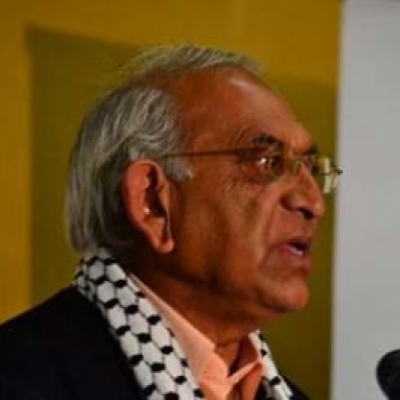



 Iqbal Jassat
Iqbal JassatNarendra Modi’s BJP regime has again come under fire from human rights organizations for abuse of power under India’s draconian anti-terror law known as the Unlawful Activities (Prevention) Act (UAPA).
In its ratings CIVICUS Monitor has graded civic space in India as "repressed" while accusing the Modi regime of relentlessly persecuting farmers, journalists, right to information activists, human rights defenders and other critics.
As is the case with most "anti-terror" laws imposed by the United States of America on many countries, the UAPA not only criminalises fundamental right to association but blurs the distinction between legitimate political dissent and downright criminality.
Analysts point out that by criminalising civil rights and the voices of activists, "political dissent suffers major delegitimisation since particular ideologies, groups and beliefs are rendered criminal".
This is primarily the result of Modi’s Hindutva nationalism which relies on anti-terror legislation to promote a culture of fear, panic and targeted witch-hunts.
And sadly, the country’s Muslim population of 230 million who include journalists, rights activists and critics, are the main targets.
In the week South Africa commemorates the 45th anniversary of the martyrdom of Steve Bantu Biko, brutally murdered by apartheid-era regime while in police custody, it is telling that India is behaving like the disgraced white minority rulers.
Take the case of human rights defender Atikur Rahman.
He has been imprisoned under UAPA for the last two years for peacefully exercising his fundamental rights in defense of victims brutalised by BJP-linked criminals.
Aakar Patel, chair of the board for Amnesty International India who has been monitoring Rahman’s arbitrary detention said:
“It is a travesty for the Indian authorities to keep Atikur Rahman in detention for almost two years on bogus charges solely for peacefully exercising his human rights. It seems the authorities are on a vindictive quest to further crush him by making his life unbearable, including by denying and delaying his medical treatment. Rahman should not have been detained in the first place. His arbitrary detention must end.”
The background to his arrest is not dissimilar to the punitive detentions practised back then in South Africa and currently in the settler colonial zionist entity in occupied Palestine.
Amnesty International reports that during October 2020, Atikur Rahman along with journalist Siddique Kappan, student Masood Ahmad and taxi driver Mohammad Alam was arrested in Mathura, in the state of Uttar Pradesh in India.
They were on their way to meet the family of a Dalit woman who was raped and murdered by a group of men from the dominant caste in Hathras.
The Uttar Pradesh police charged them with ‘sedition’, ‘promoting enmity between groups’, ‘outraging religious feelings’ and ‘criminal conspiracy’ under the Indian Penal Code and ‘raising funds for terrorist act’ and ‘conspiring to commit a terrorist act’ under the UAPA.
In November 2021, Atikur Rahman was admitted to the All India Institute of Medical Sciences (AIIMS) in Delhi for an open-heart surgery after his family filed a writ petition in the Allahabad High Court.
Since March 2022, he has been hospitalised multiple times.
His medical documents state, in addition to an existing heart ailment, he has now developed a neurological disease.
The left side of his body has been paralyzed and he suffers from memory loss.
Clearly, as Patel points out, the Indian authorities are on a vindictive quest to further crush activist Rahman by making his life unbearable, including by denying and delaying his medical treatment.
“Rahman must be released immediately and all politically motivated charges against him dropped. Pending his release, the Indian authorities must ensure that his detention conditions are improved in line with international standards and that he has immediate and regular access to his family and any healthcare he may require. Subjecting Rahman to inhumane conditions and failing to provide adequate medical treatment is a human rights violation.”
While legal efforts are underway to have him released, Rahman’s wife Sanjida Rahman raised alarm about his deteriorating health.
She said he is disorientated and having speech difficulties.
“His condition is so bad, at least pity him now,” she pleaded.
“I mean there is nothing left now, why are they still doing it? It is not even about justice now; it’s about sparing his life as it dangles.”
Speaking to the media, Rahman'’s attorney Saifan Sheikh, said his client has been suffering from aortic regurgitation –a condition that occurs when the heart’s aortic valve doesn’t close properly.
As a result, some of the blood pumped out of the heart’s main pumping chamber (left ventricle) leaks back.
While Rahman’s unfair incarceration hangs in the air, his colleague Siddique Kappan has finally after 700 days in captivity been granted bail.
That he as a journalist was jailed alongside Rahman for trying to visit the family of a Dalit woman who was gang-raped and her body burned in mysterious circumstances, explains the draconian nature of India’s anti-terror legislation.
South Africa’s ties with the Modi regime need to be placed under the microscope if we as a country have any regard for the massive abuse of power and targeting of journalists, human rights advocates, Dalits and Muslims.
That India is a member of the BRICS alliance, makes it all the more important for South Africa to raise its concerns especially in light of damning findings by a panel of international law experts recently.
Following their probe on serious human rights violations against Muslims in India since 2019, the panel found that there is credible evidence to suggest that a wide range of human rights of Muslims have been violated.
According to the evidence reviewed, federal and state-level authorities “adopted a wide range of laws, policies and conduct that target Muslims directly or affect them disproportionately.”
While Rahman awaits release, it is crucial to be reminded of additional serious findings by the panel that some of the violations may amount to crimes against humanity, war crimes and incitement to commit genocide.
Iqbal Jassat, Executive Member, Media Review Network, Johannesburg, South Africa
